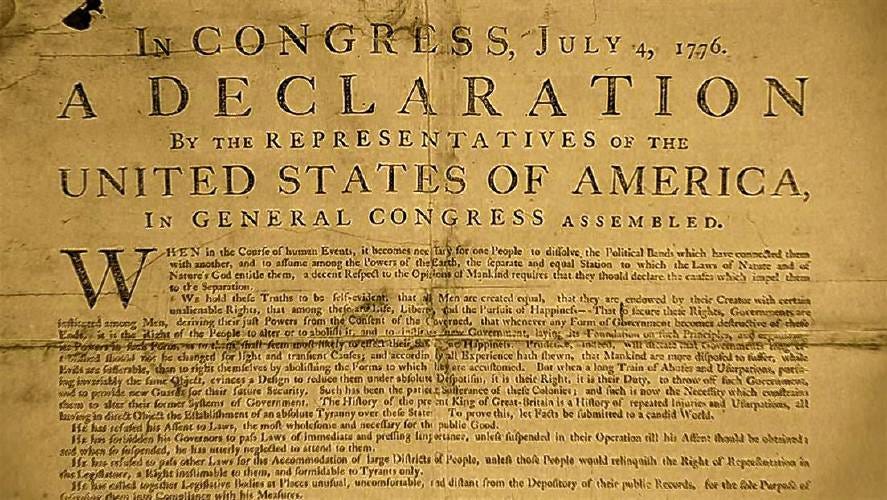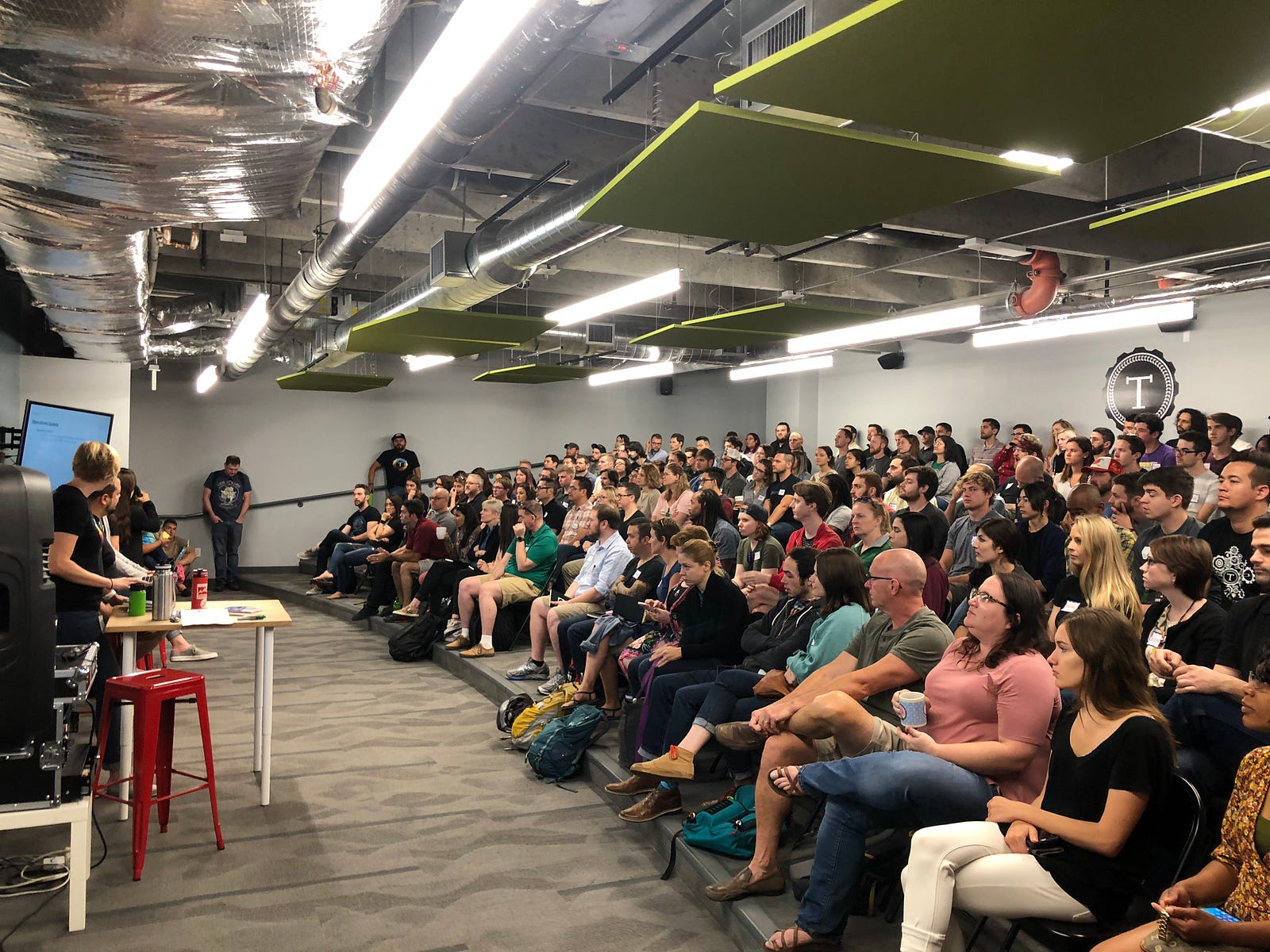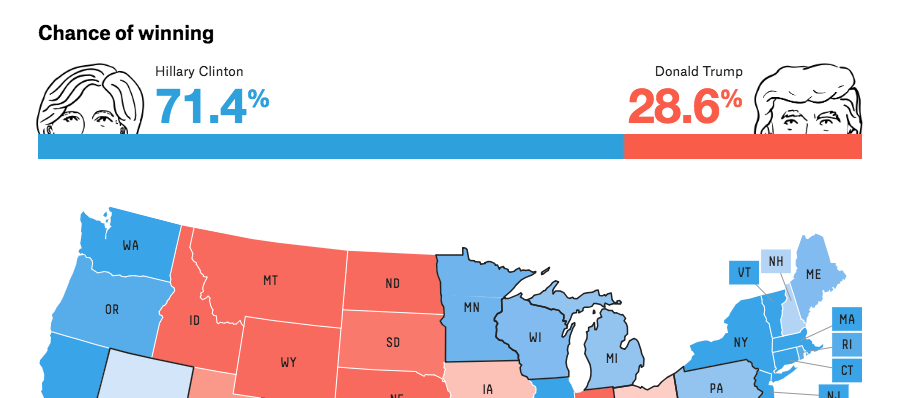On That We Cannot Compromise
Last week I had the opportunity to discuss a collection of texts aggregated by the Aspen Institute for their “Becoming an Inclusive Republic” seminar.

On That We Cannot Compromise
Last week I had the opportunity to discuss a collection of texts aggregated by the Aspen Institute for their “Becoming an Inclusive Republic” seminar. It included, in whole or in excerpt, eleven writings (full list below) across the two-hundred year history of the United States. Turing’s mission is anchored by building a diverse and inclusive community — so exploring these issues is of the utmost importance to our work.
The founding premise of the conversation was that American politics, and perhaps American society, is divided. Presidents Obama and Trump have provided clear measuring sticks of what we’re for and against. Topics like immigration, environmental regulation, national security, and taxation are multi-faceted and worthy of debate.
The majority of citizens do not approach them as a buffet of options, but instead simplify to party affiliation. If you’re a democrat you’re open to immigration, accept regulation as a path to environmental protection, tend to deemphasize national security, and are typically ok with taxation as a path to social benefit. Republicans are skeptical of immigration, consider environmental regulation as a negative impact on jobs and business, put national security as a top-tier concern, and are generally against taxation in any form.
These are topics worthy of discussion, debate, and compromise. There are multiple valid ways to approach solutions and progress.

In the final reading, Identity: The Demand for Dignity and the Politics of Resentment, Fukuyama writes:
Successful democracy, according to [Alexis de Tocqueville], requires citizens who are patriotic, informed, active, public-spirited, and willing to participate in political matters. In this age of polarization, one might add that they should be open-minded, tolerant of other viewpoints, and ready to compromise their own views for the sake of democratic consensus.
Governor John Hickenlooper, a noted cross-party collaborator, echoed a similar sentiment in remarks at the seminar. He recommend that the way to close our political divide is “to listen harder.”
These prescriptions oversimplify the nature of the challenge. There is no one right protocol because there are two major categories at play in our modern politics: national policy and individual rights. Approaches to national policy on the environment or taxation are worthy of thoughtful debate. Individual rights, however, are beyond negotiation.

Individual Rights as a Collective Foundation
The Declaration of Independence famously starts with:
We hold these truths to be self-evident, that all men are created equal, that they are endowed by their Creator with certain unalienable Rights, that among these are Life, Liberty and the pursuit of Happiness. — That to secure these rights, Governments are instituted among Men, deriving their just powers from the consent of the governed, — That whenever any Form of Government becomes destructive of these ends, it is the Right of the People to alter or to abolish it, and to institute new Government, laying its foundation on such principles and organizing its powers in such form, as to them shall seem most likely to effect their Safety and Happiness.
The Declaration defined the context in which we could justify building a nation. It explained the monarchy’s violation of our basic human rights. It highlighted, among those rights, life, liberty, and pursuit of happiness. It declared the right of the people to alter or abolish their government and replace it with one “likely to effect their safety and happiness.”
We must recognize the Declaration sets up the individual as the nuclear, essential unit of our country. Another country might have been built by emphasizing the collective first and extracting the value of the individual. But ours was created with the individual as the sacred center and the collective as an aggregation of individuals.
All Men
In his book Strength to Love, Martin Luther King Jr. highlights the phrase “that all men are created equal.” While much of our thought centers on the idea of “equal”, he argues, the easiest way to resolve the argument is a pessimistic definition of “men.” By carefully selecting who fits in that definition we fundamentally change the meaning of the document.
The authors of the Declaration did surely mean men by gender. Among those they likely meant landowners. The potential rights of the enslaved, of women, of immigrants were simply outside the scope of their consideration. Which rights did or did not confer to those groups were not debated, they were simply ignored.
Centuries later we reinterpret those words for our modern world. Surely when they said “men” they should have said “men and women,” right? But did they mean people of color? Did they include undocumented immigrants? What about gay people? Transgender people? Felons who have been released from prison? Children with legal citizenship born to undocumented parents? Who are these “men” you spoke of? Where do we draw the defining lines of humanity? Who is invited to be part of “We the People”?

In “Paul’s Letter to American Christians,” King writes:
[Segregation] relegates persons to the status of things. It scars the soul and degrades the personality. It inflicts the segregated with a false sense of inferiority, while confirming the segregator in a false estimate of his own superiority. It destroys community and makes brotherhood impossible.
We draw lines between humans to define the “other,” to degrade their humanity, and in doing so, degrade our own.
Power Through Division
President Trump is a master at drawing lines and defining “others.” His approach to win at all costs comes through defining an other, demonizing them, and declaring that we will win. We will bring back order — the one where we were always on top. We will put other nations in their place — subservient and envious.

In South Carolina, then-candidate Trump told his audience:
We’re going to win so much. You’re going to get tired of winning. you’re going to say, ‘Please Mr. President, I have a headache. Please, don’t win so much. This is getting terrible.’ And I’m going to say, ‘No, we have to make America great again.’ You’re gonna say, ‘Please.’ I said, ‘Nope, nope. We’re gonna keep winning.’
You can’t win without opponents. So he’ll take every opportunity to remind his we of who threatens their understandings, their comforts, and their way of life.
Finding Your Enemies
Last weekend, an advisory memo from his administration explained:
Sex means a person’s status as male or female based on immutable biological traits identifiable by or before birth
We have a cultural obsession with gender. We’ll classically address a crowd with the opening “Ladies and Gentlemen.” When we don’t know someone’s name, we reach for gender first: “I was talking with the woman at the register.” We segregate most public bathrooms by gender where it’d be far more reasonable to segregate them by physical need. Being able to group people by their observable gender is somehow core to our cultural understanding of the world: it’s one of the ways we understand and enact power structures.
Transgender people, genderqueer people, androgynous people — there are many ways to not fit into a simple binary. Many cultures and places in history those identities have been honored and celebrated. Sometimes those ambiguities challenge our cultural instincts about who would and wouldn’t want to mate with us. We don’t automatically know what pronoun to call someone — though the Webster dictionary is trying to help. And, collectively, they cause huge problems like…what?
What threats is our government protecting us from? Isn’t it a modern version of the fears about a black person using the same water fountain as a white person or sitting where they please on a city bus? Is it a fear of the dramatic alteration to our language? Maybe we’d have to give up “the woman at the register” and instead say “the person at the register” — recognizing them as a person rather than a gender.

Compromising on Human Rights
To define people by “immutable” biological traits at birth is to erase those people whose physical attributes at birth do not define their sex. It undercuts their self-defined identity and, instead, declares that the core of your person will be decided by a doctor. You may change your name, your hair, your profession, your language, or your citizenship. But your sex — this is the one thing you may never change. We’ll tell you what it is.
And what of life, liberty, and the pursuit of happiness? The only way to justify excluding people, as a believer in this American dream, is to say that they’re not “men.” A fair, modern revision of the Declaration might substitute “people” or “human beings” into that famous opening. To deny people their existence, then, is to deny them their humanity.
Fukuyama wrote “in this age of polarization, one might add that they should be open-minded, tolerant of other viewpoints, and ready to compromise their own views for the sake of democratic consensus.” The value of compromise sounds like an enlightened position borne of strength. But when it comes to the issues of human rights, who is to be included in “we”, on that we cannot compromise.
There will be no return to a human compromised down to three-fifths of a person. The inevitable march of progress has continued to refine our understandings of these self-evident truths. Human rights must be above debate and, thus, above compromise.

Building a Community
It’s easy to draw divisions. It’s tempting to “other” people to create a place where we can justify blaming them. But if we want to build a future of collective success, we must fight these temptations.
If we can focus on the humanity of one another, if we can celebrate both our commonalities and our differences, then we can stitch together a diverse, inclusive community. We can honor and welcome people across the gender spectrum. We can celebrate the individual’s right to identify themselves regardless of their government, assignment at birth, or the prescriptions of others.
Turing is an imperfect community led by imperfect people. But as we strive to be both diverse and inclusive, it’s critical that people understand their value is not dependent on their identity. But it’s not the case that everyone is welcome here. Your inclusion is contingent on how you interact with and show up for others.
To acknowledge and honor each other’s humanity is our most basic expression of love. King wrote that “love is the most durable power in the world.” And, to those who’d practice it, he wrote:
Do not despair if you are condemned and persecuted for righteousness’ sake. When you testify for truth and justice, you are liable to scorn. Often you will be called an impractical idealist or a dangerous radical. You may even be called a Communist merely because you believe in the brotherhood of man…Do not worry about persecution…you must accept this when you stand up for a great principle.

Where We Go From Here
In October 2016 the presidential race was over. The data clearly laid out a Hillary victory. The Trump campaign seemed like a zombie, just stumbling to the finish line. On the night of the election, the unimaginable had happened.
Two years later, it’s not clear that we’re much smarter. Tonight I’ll begrudgingly make calls on behalf of a Congressional candidate. It feels pointless as they are up some 8% in the polls, but I keep reminding myself that we’ve been here before.
We can think that 2018 races will prove a return to reason and principles in politics. It won’t. Really, look at the field now and name a candidate who can meaningfully challenge the President in 2020. Without sustained, aggressive efforts, our country will be stuck in this downward spiral for at least another six years.
The Declaration said “Governments are instituted among Men, deriving their just powers from the consent of the governed.” If your representatives don’t have your consent, you’d better go do something about it.
Seminar Source Readings
- U.S. Declaration of Independence
- Federalist #10: The Union as a Safeguard Against Domestic Faction and Insurrection by James Madison
- Address Before the Young Men’s Lyceum of Springfield, Illinois by Abraham Lincoln
- What to the Slave is the Fourth of July? by Frederick Douglass
- Seneca Falls Declaration of Sentiments and Resolutions by Elizabeth Cady Stanton
- The Struggle for Human Rights by Eleanor Roosevelt
- Amendments 13, 14, 15, and 19 to the U.S. Constitution
- Why I am a Republican by Dwight Eisenhower
- How the White Working Class Lost Its Patriotism by J.D. Vance
- Habits of the Heart: Individualism and Commitment in American Life by Robert Bellah
- Identity: The Demand for Dignity and the Politics of Resentment by Francis Fukuyama
I’m Jeff Casimir, the founder and Executive Director of the Turing School of Software & Design. This article was reviewed, critiqued, and improved by Erin Williams, Ellen Mary Hickmann, Lo Brenner, and Sarah Schnall.

